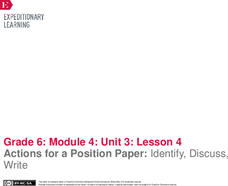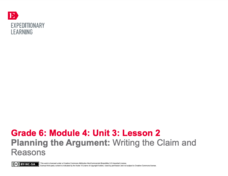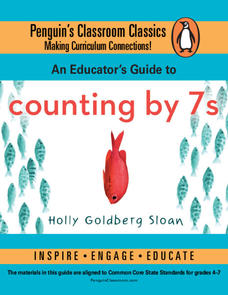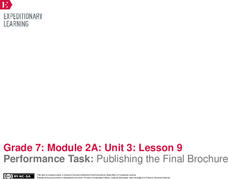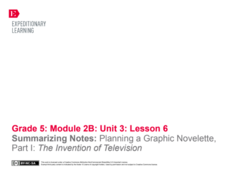EngageNY
Research: Paraphrasing Relevant Information
Readers take a look at the source Ethical Style: How Is My T-Shirt Made? and discuss how to say the information in the article without plagiarism. Learners make note of and underline sentences that may present a problem in paraphrasing....
EngageNY
Actions for a Position Paper: Identify, Discuss, Write
Anchors aweigh, it's time to write! After viewing an anchor chart detailing the parts of a position paper, pupils share their plans for their essays with a partner. Next, they write the rough draft of their body paragraphs.
EngageNY
Relationships Between Key Scientific Concepts: Planning What Causes Earthquakes
That is ground shaking news! Scholars read Earthquake in multiple reads to determine the gist, identify cause and effect relationships, and understand vocabulary. Learners complete graphic organizers to describe what happens before and...
EngageNY
Revising: Strong Conclusions for My Accessing Books Around the World Informative Paragraph
It's important that writers leave their readers with a strong and satisfying conclusion. Help your young writers develop the skills to compose a concluding sentence with the steps outlined here. After class members have had a chance to...
EngageNY
Mid-Unit Assessment: Completing My Draft Position Paper
What's the difference? Scholars analyze the similarities and differences between introductory and concluding paragraphs. Then, using a model essay as a guide, they write their draft position papers.
EngageNY
Planning the Argument: Writing the Claim and Reasons
Step up! Using the resource, scholars discover the six steps to writing an effective position paper. Next, they work on a graphic organizer to begin planning their argument-based essays.
Penguin Books
An Educator's Guide to Counting by 7s
Everyone takes a different journey through grief. A series of lesson plans for the novel Counting by 7s introduces readers to the main character who loses her parents in a car crash. Discussion questions and writing prompts combine...
EngageNY
Setting Purpose for Research: What are Fair Working Conditions?
Life may not be fair but working conditions should be. Scholars research working conditions at Wegmans by studying the company website. They complete a working conditions anchor chart and discuss their findings in a think-pair-share...
EngageNY
End of Unit 3 Assessment: Writing a Research Synthesis
Ready, set, write! Scholars work on the end-of-unit assessment by completing a writing prompt. They then look at the model performance task from instructional activity two to create a rubric for scoring the exercise. Using turn and talk,...
EngageNY
Researching: Asking the Right Questions
Learners look over the iCare about the iPhone performance task and discuss how it relates to working conditions. They then review the research process and place focus on the step of asking questions. Finally, scholars ask questions to...
EngageNY
Performance Task: Publishing the Final Brochure
Add your final touches! Seventh graders finish the final draft of the brochure they began in the previous lesson. They then reflect by talking with other learners to discuss their work. Peers talk about the choices they made in layout as...
EngageNY
Performance Task: Hosted Gallery Walk of Scientific Posters
The guests have arrived. Scholars participate in a hosted gallery walk, using their scientific posters to share their research about DDT with their classmates. Then, using sticky notes, individuals leave positive feedback on their peers'...
EngageNY
Speaking and Listening Skills: Practice
After reviewing their resources from the unit, scholars participate in multiple group discussions with a World Café activity. During the discussions, they share ideas about their focus questions pertaining to Canada's natural resources...
EngageNY
Relationships Between Key Scientific Concepts: What Causes Hurricanes?
A storm is brewing in the sea. Scholars complete multiple reads of How Does a Hurricane Form to determine gist, cause-and-effect relationships, and deepen vocabulary understanding. To finish, they complete graphic organizers to record...
Curated OER
How to Create and Manage Student Portfolios
Tips and ideas on how to establish and manage successful student portfolios.
Curated OER
It's All Greek and Latin to Me!
Give your pupils a skill they can use for life by introducing the use and comprehension of Latin and Greek root words.
K-3 Teacher Resources
Today is a Gift - Children's Quote
Emphasize the importance of today with a brightly colored classroom poster. Kids can use the message to move away from their past and focus on what they can do today. The resource main page includes activities for quote books and other...
Thoughtful Learning
Setting and Reaching Goals
An activity boosts self-management through goal setting and reflection. Scholars choose one goal they wish to obtain by the end of the week. Participants brainstorm ways to make their goal a reality then reflect on whether or not their...
EngageNY
Summarizing Notes: Planning a Graphic Novelette Part 1: The Invention of Television
What's the story? Learners create the first of four storyboards about the invention of the television, incorporating narrative techniques and descriptive details. Next, they offer and receive feedback by participating in a peer critique...
EngageNY
Summarizing Notes: Planning a Graphic Novelette, Part II: The Invention of Television
Let's work together! Using the collaborative resource, scholars work in triads to begin section two of their storyboards about Philo Farnsworth, the inventor of the television. They then practice using linking words and phrases to...
EngageNY
End of Unit Assessment: Perspectives on Natural Disasters
Caption this! Scholars complete the end of unit assessment by rereading In the Middle of the
Storm. Learners answer written response questions about the text, and then create drawings to accompany their work. To finish, they caption the...
EngageNY
Analyzing Point of View: Inferring about the Natural Disaster in Eight Days
Who is telling the story? Readers take a look at the text Eight Days to determine if the story is told in first or third person. They then discuss in groups and complete a shared writing activity to describe how the narrator's point of...
Curated OER
Question What You Read
Readers test their reading comprehension after reading a nonfiction text about Paleo Indians. (This text is in Alabama: It's History and Geography, but other texts can be used.) After reading the nonfiction article as a class, they...
Curated OER
The 5 W's
Examine how to answer who, what, when, where, and why when reading text. Young writers listen to the story Skeleton Hiccups, and as a class answer and discuss the five W's. Independently they read the story silently, and write the...
Other popular searches
- Silent Reading Comprehension
- Independent Reading Response
- Independent Reading Projects
- Independent Reading Goals
- Silent Reading Strategies
- Independent Reading Contract
- Independent Reading Centres
- Independent Reading Choices
- Independent Reading Unit
- Independent Reading Cent Res
- Independent Reading Guide
- Silent Reading Activities



